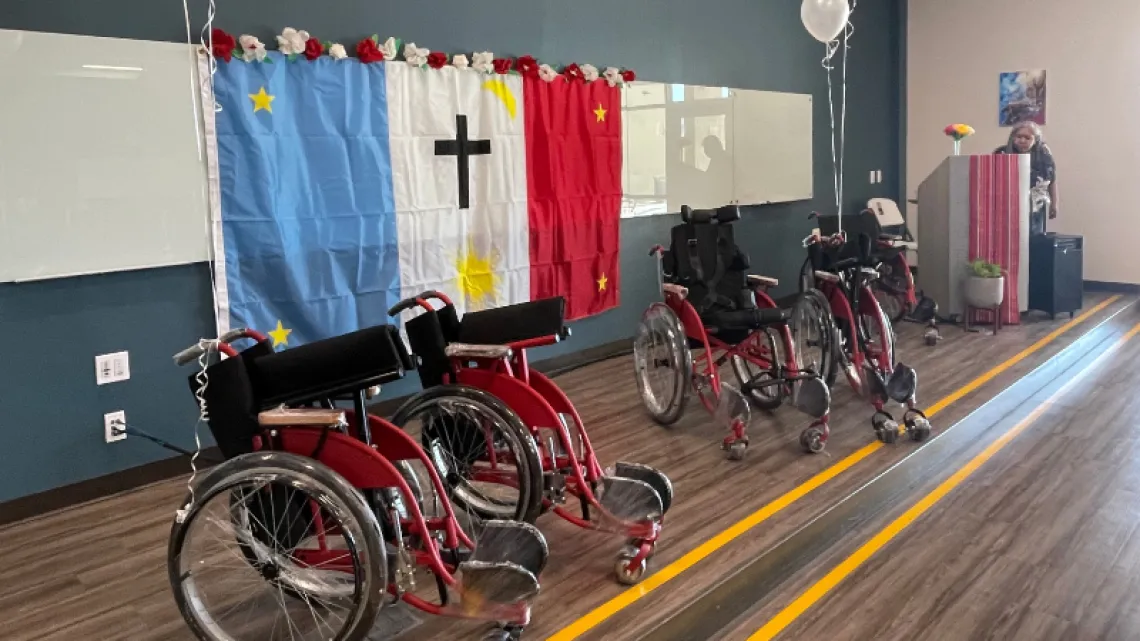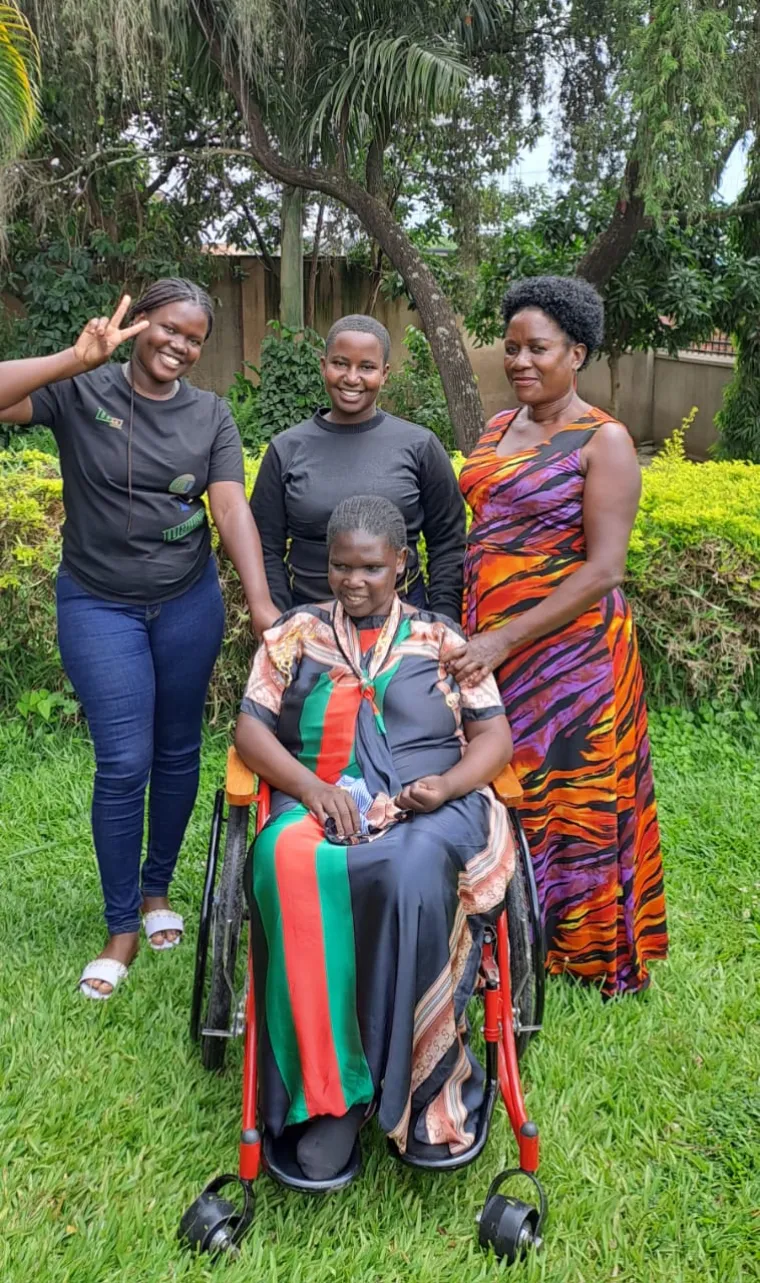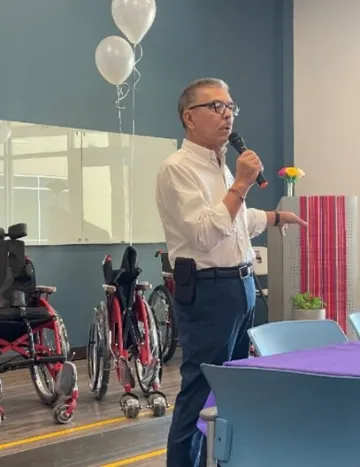Access Is Opportunity: ARSOBO’s Wheelchair Donations Helping Rural Communities

Arizona Sonora Border Projects for Inclusion (ARSOBO) is a project dedicated to providing people with disabilities in underserved areas the accessibility tools they need to be full participants in their communities. These tools include hearing aids, prosthetics, and specially designed RoughRider wheelchairs that are built for the rough terrain of rural areas.
ARSOBO has been expanding its efforts to reach more people in need worldwide. Among ongoing activities in northern Mexico, two notable international donations of RoughRider wheelchairs took place recently: one in the Busoga region of Uganda, and the other to the Pascua Yaqui Tribe in Southern Arizona.
Earlier this year, a friend of Sonoran Center’s director Wendy Parent-Johnson introduced ARSOBO to a gentleman named Mutumba Fasai from the Busoga region of Uganda. With Mutumba, ARSOBO and the Sonoran Center coordinated the donation and delivery of several RoughRider wheelchairs to the region.
“Donation of a wheelchair is a life changing event, which at [the] time bring tears of joy,” expressed Mutumba, upon receipt of the wheelchairs.
One of the recipients, Mildred, was mostly confined in her room because of mobility challenges prior to receiving her wheelchair.
“When [Mildred] saw the wheelchair and she was told it was a gift to her, she could not hold back tears. Everyone around got emotional,” Mutumba continued. “Feedback from recipients and their families is positive, in regards comfort and quality. They pass on great appreciation to the team in Arizona, they are so grateful for the life changing technology.”

Mildred [front], after receiving a RoughRider wheelchair from ARSOBO.
On July 27, 2023, a ceremony was held to commemorate another delivery of wheelchairs by ARSOBO to the Pascua Yaqui Tribe in Southern Arizona. In total, the tribe will be receiving approximately 80 chairs of all sizes, including chairs designed especially for children.*
After an opening prayer and introductions from the Tribal Council, several representatives from the Pascua Yaqui Tribe spoke to express their gratitude for this donation, including Mildred Manuela, Deputy Director of Education for Pascua Yaqui.
Manuela, as one of the original collaborators on this project, was emotional as she spoke of the long road to get here, and the impact these chairs and the ability to be mobile will have on tribal members' lives.
"Now they will have the opportunity to participate [in the community],” Manuela said. “Right now, they don't — they just stay home. Not because they want to, but because they can't. Now, they can.”

Francisco ‘Kiko’ Trujillo, speaking at the ceremony on July 27.
Francisco ‘Kiko’ Trujillo, executive director and co-founder of ARSOBO, spoke a few words about the production of the chairs at the ARSOBO workshop in Mexico. He highlighted that the wheelchairs were built by three people with disabilities, two of which are wheelchair users themselves.
R. Joshua Drywater, Native Initiatives program manager at the Sonoran Center, spoke of the impact that he sees these chairs having, and how the opportunities they provide are both practical and symbolic. "The culture is tied so much to the land, and the durability of the wheelchairs gives wider accessibility to the land,” he said in his remarks.
15 Years of Impact
Started in 2008 as a result of that year’s Border Conference on Disabilities in Nogales, Mexico, ARSOBO has since grown to provide resources for people in 10 states and 90 municipalities in Mexico, as well as overseas in Guatemala, Tanzania, Peru, France, and Uganda. Based in Nogales, the organization is headed by its co-founders, Sonoran Center affiliate faculty Dr. Burris "Duke" Duncan and Kiko Trujillo.
The Sonoran Center for Excellence in Disabilities has worked with ARSOBO at every stage of the process.
“This whole project started with the Sonoran Center,” explained Dr. Duncan. “[I was asked] to organize a border conference on disabilities. I didn’t want this to be a conference where you learn some stuff but nothing happens afterwards. But then I got this idea. I said ‘Okay, I’ll do it, with one provision: I want to open up a shop in Nogales, Mexico, and build all-terrain wheelchairs.’ That was the beginning. The Sonoran Center has been the instigator of this thing since its inception. I’ve been tagging along with it as a member of the Center since then.”
The RoughRider wheelchair is uniquely suited to the challenges of “off road” travel.
“It starts with just a long steel pipe, and the workers shape the curves on the chair to make the chair. It’s actually incredible craftsmen who do this. A lot of it is put together with welding or nuts and bolts, so if it needs any repairs you can take it to the welding shop where you live, or you can go to a hardware store and get the bolts and nuts you need to fix it,” Dr. Duncan explained.
“The front wheel is placed in front of the footrest rather than behind it like most conventional chairs, and the actual distance from the front wheel to the back wheel is about a third or more longer than the conventional chair. So, weight is distributed to the back of the chair, so it really cannot be tipped over frontwards. The back wheel is essentially a mountain bicycle tire, so this chair will go anywhere. If you have the power to move it, it’ll go over rocks, sand, mud - wherever you’d want to go. I think it really is the chair that’s best made for rough terrain.”
These chairs might sound expensive, but their durability makes them a reliable long-term investment.
“Many NGOs in the US are well-intended by taking a conventional chair and refurbishing it, and then getting it off to Mexico or Guatemala or other places, but unfortunately, it’s on rough terrain so the chair doesn’t last very long. So it’s thrown in a heap someplace. It’s well-intentioned but it’s not the right chair. We feel that the chair we’re making is the right chair: it’ll last for years.”
After working with ARSOBO for 15 years, Dr. Duncan has a few more stories of his own that illustrate how life-changing this equipment can be:
“There was one gentleman with diabetes who had both legs amputated. And he was just sitting in his home kind of vegetating away. Very unhappy and didn’t know what to do with his life. He heard about our place and came down and visited. We trained him and he was hired. It completely changed his life, because now he could get out, he had a responsibility to come to work and he got paid for it. It changed him. It was a tremendous change. [There was also] a fisherman in the Sea of Cortez. Now he’s in his boat fishing again, because he’s got a [prosthetic] leg that allows him to get into the boat and throw the net out.”
“We have one little boy we saw when he was 10 years of age. He was born without legs, and some deformities in his hand. A congenital problem. He was sitting on his grandmother’s lap and the technician was wrapping his legs with plaster to make molds out of his residual limbs. She gets this idea: she looks at him and says, ‘Georgie, how tall do you want to be?’ Because she could make the prosthetics as long as he wanted. He says, ‘About 20 centimeters taller than I am now.’ She says, ‘That’s a lot, let’s start with 10.’ She did that, and now he has knees. He can walk like everybody else. Three months later his grandmother calls us and says, ‘You won’t believe this, but he’s out there playing soccer.’ This kid now drives a car. He’s got a job. He’s got a girlfriend.”
Dr. Duncan says that in the long term, the goal for ARSOBO is to one day be self-sustaining.
“We want this thing to keep going without grants and donations. We’re trying hard to achieve that, but it’s a hard one. We’re trying to get other contracts to keep us alive, so that’s kind of the state of where we are right now. That’s kind of my goal, to make that happen. We have to get other programs that’ll give us a steady income to create the self-sufficiency as we want.”
To learn more about ARSOBO, contact Duke Duncan.
The Community Foundation for Southern Arizona and the Andy Nichols Foundation gave funds to ARSOBO for the construction of the RoughRider all-terrain wheelchairs given to the Pascua Yaqui Nation.
